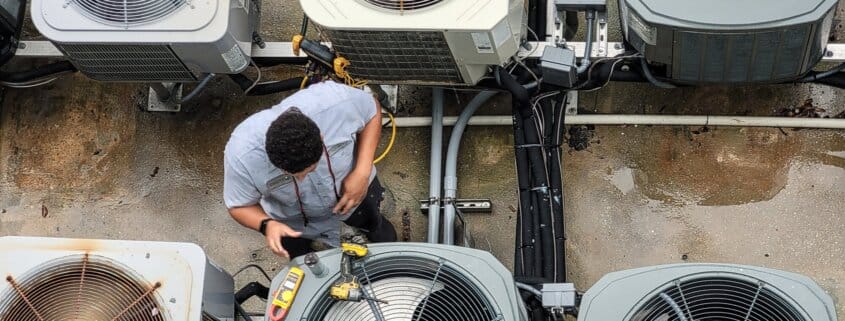14 HVAC Industry Terms That Homeowners Should Know
As a homeowner, and a customer of the HVAC industry, you don’t need to know everything about how to ensure your heating, cooling, and other appliances stay in good, working condition. The professionals can handle a lot of that for you. However, being more familiar with some of the terminology and phrases we use can help you more quickly notice and identify issues with your systems.
This can help you know when you need a professional to come take a look at these systems, and maybe even learn how to fix a few of the more simple problems, yourself. Here are a few of the terms that you should know, and what they mean.
Key HVAC Terms You Should Know And Their Meaning
HVAC
Starting with the most basic of them all, this refers to Heating, Ventilation, and Air Conditioning. It often refers to all of the heating and cooling systems of the property, including the heater, AC, and any ductwork.
HVAC/R
Sometimes, you will see an ‘R’ added to the more common term. This stands for Heating, Ventilation, Air Conditioning, and Refrigeration. Professionals who add the R often specialize in repairing, servicing, and maintaining refrigerating appliances.
Refrigerant
The key ingredient of many an HVAC appliance is a liquid that cycles through the system. Refrigerant is heated, cooler, and pressurized to both remove and add heat to the air. Refrigerant comes in a few varieties and typically lasts up to 15 years, provided there are no leaks or issues with it.
Air filter
Another important component in HVAC systems, this device removes contaminants, allergens, and other matters from the air. These typically have to be replaced after some time, with how long depending on the type.
Compressor
The device that pumps the refrigerant through most modern HVAC systems, is usually found inside the box unit inside the home. It raises the pressure and temperature of the refrigerant, turning it into a gas form.
Condenser coil
Tubes that are filled with refrigerant. These tubes remove the heat from the hot, gaseous refrigerant, which typically turns it back into a liquid again.
Evaporator coil
This part of your HVAC system absorbs heat into the refrigerant and is usually attached to the furnace or inside your air handler.
Thermostat
These are a network of sensors that monitor and communicate the temperature of certain areas. The functions of the heating and cooling system turn on and off based on the readings of the thermostat, allowing users to see and maintain the temperature of their choice in a given space.
Ductwork
These are pipes that are designed to channel airflow, whether it’s supply air or exhaust air, throughout a home. They can be made from a variety of different materials, such as aluminum, galvanized steel, fiberglass, and more.
Airflow volume
When talking about air circulated inside a particular space, we use this measurement. It’s usually measured in cubic feet per minute, and you want to make sure you get a good airflow volume for the space you’re in when choosing things like ventilation and AC.
SEER
The Seasonal Energy Efficiency Ratio is the rating we use for the efficiency of air conditioners. This is worked out by comparing the cooling output to the total electricity input of a single season. The higher the rating, the more efficient the AC device.
AFUE
Like the SEER, the AFUE (Annual Fuel Efficiency Ratio) measures the energy efficiency of a heating system in a year. It works as a percentage, showing how much of the energy you use is converted to heat. As such, a 90% AFUE means 90% of your energy is converted into heat, and 10% is lost through exhaust. A rating of 80% or below is typically an indicator that a heater should be replaced.
MERV
Air filters have Minimum Efficiency Reporting Values, which is the standardized method to measure air filters. They go from 1 to 16, with 16 being the most efficient and 1 being the least. Depending on your needs, you may require air filters with a specific MERV level.
NATE
North American Technician Excellence, is a form of certification for technicians that is used as a measure of excellence and expertise. Professionals with this certification have had to pass certification tests.
Contact an HVAC Professional in Northern Virginia
If you ever encounter an issue with your HVAC systems that you don’t understand, then the help of an HVAC professional could be just what you need. Get in touch with Briggs HVAC and we’ll be glad to lend you our expertise, too.



